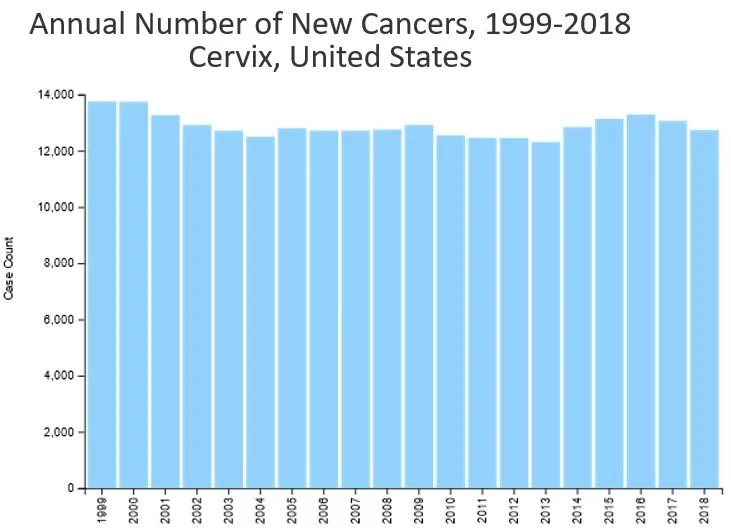Cervical Cancer Awareness Month
Ladies, it’s time to discuss the importance of Women’s Health!
January is Cervical Cancer Awareness Month.
Did you know that more than 12,000 women in the United States are diagnosed with invasive cervical cancer each year?
The majority of cervical cancers (up to 64%) occur in women who were rarely or never screened.
Cervical cancer screening is easy, fast, and can save lives by early detection!
CDC Annual Number of New Cervical Cancer Cases. Source - U.S. Cancer Statistics Working Group. U.S. Cancer Statistics Data Visualizations Tool, based on 2020 submission data (1999-2018): U.S. Department of Health and Human Services, Centers for Disease Control and Prevention and National Cancer Institute; https://www.cdc.gov/cancer/dataviz, released in June 2021.
One important part of routine appointments with your primary care doctor is to discuss and review screening tests for preventable diseases. Be sure to talk to your primary care physician about cancer screening tests that may be appropriate, such as for colon, breast, and cervical cancer.
WHAT IS A CERVIX?
The cervix is the bottom part of the uterus, where it meets the vagina. There is a small opening in the center of the cervix, called the cervical canal.
WHAT IS CERVICAL CANCER SCREENING?
Screening tests detect for cancer cells in the cervix. Screening tests are also able to find cells that could potentially turn into cancer, called "precancer." These tests can find cervical cancer and precancer in the early stages, when it can be treated or even cured.
WHEN TO START SCREENING FOR CERVICAL CANCER?
Screening guidelines recommend that you start having cervical cancer screening when you turn 21 years old. You should start getting Pap tests at the recommended age, regardless of whether you have ever been sexually active. You do not need to start cervical cancer screening before age 21, even if you became sexually active at a younger age.
DO I NEED TO PREPARE FOR A PAP OR HPV TEST?
Not at all! You do not need to do anything special in preparation. It may be recommended to schedule your test when you do not expect to have your period, but don't worry if you do have your period on the day of the test. Screening can usually still be done even if you are bleeding.
WHAT TESTS ARE USED FOR CERVICAL CANCER SCREENING?
There are a few different ways to screen for cervical cancer:
Papanicolaou testing: This is the most commonly used test for screening. You may have heard it referred to sometimes as a "Pap smear" or “Pap test”. This procedure takes less than 5 minutes, and most women report it to be painless or may have minimal discomfort. This testing involves your doctor visualizing your cervix with a small utensil called a vaginal speculum. With a small brush, he or she will gently scrape the surface of the cervix to collect a sample of the cells of the cervix. This sample is then sent to the lab for review, where an expert examines it under a microscope to look for any signs of abnormalities.
HPV test: HPV stands for the "human papillomavirus." It is the virus that causes cervical cancer. An HPV test involves testing cells from the cervix for certain types of what we refer to as “high risk” HPV.
Combination testing: This testing involves performing both a Pap and HPV test at the same time.
HOW OFTEN DO I NEED TO BE SCREENED FOR CERVICAL CANCER?
Screening guidelines recommend that women between the ages of 21 to 29 years old should have routine screening every 3 years.
If you are between the ages of 30 to 65 years old, the screening guidelines recommend either: option 1) a Pap test every 3 years, OR option 2) Combination testing (Pap test with HPV testing) every 5 years.
If you are age 65 years or older, you can stop having cervical cancer testing if: 1) you have had Pap tests done regularly until you turned 65, or 2) you have had 3 normal Pap tests in a row or 2 normal combination testing over the past 10 years (with the most recent test within the last 5 years).
However, if you have had abnormal results, you will need to discuss with your doctor when you should return for a follow-up Pap test or need additional testing.
WHAT DOES THE PAP NOT TEST FOR?
The Pap test does not test for sexually transmitted infections such as chlamydia, gonorrhea, herpes simplex, syphilis, or HIV.
WHAT IF I’VE HAD THE HPV VACCINE?
Although having the HPV vaccine lowers your chances of getting cervical cancer, it does not completely protect you or prevent cervical cancer. It is strongly recommended to still be screened for cancer or precancer.
HOW MUCH DOES A PAP TEST COST?
Pap testing may be covered as a preventive service, depending on your insurance plan,
Testing may be expensive if you are underinsured or uninsured.
If you are a member of Sunny Family Medicine, we are able to provide affordable prices for many screening tests including Pap tests. The price of our Pap test is $30 to $60.
THE BOTTOM LINE
Thankfully cervical cancers usually take years to develop. If you are getting screened regularly every 3 or 5 years, you are extremely unlikely to develop cervical cancer.
If you have not been getting screened regularly, please schedule your cervical cancer screening as soon as possible.
Cervical cancer screening is easy, fast, and can save lives. Let’s take control of our feminine health.
HOW CAN I SIGN UP FOR AN APPOINTMENT FOR A PAP SMEAR?
To make an appointment with Dr. Christian or Dr. Nina, head over to our scheduling page . After you submit your information. Dr Nina will reach out and offer appointment times.
Thank you for reading and wishing you a great day.
-Dr. Nina with Sunny Family Medicine

